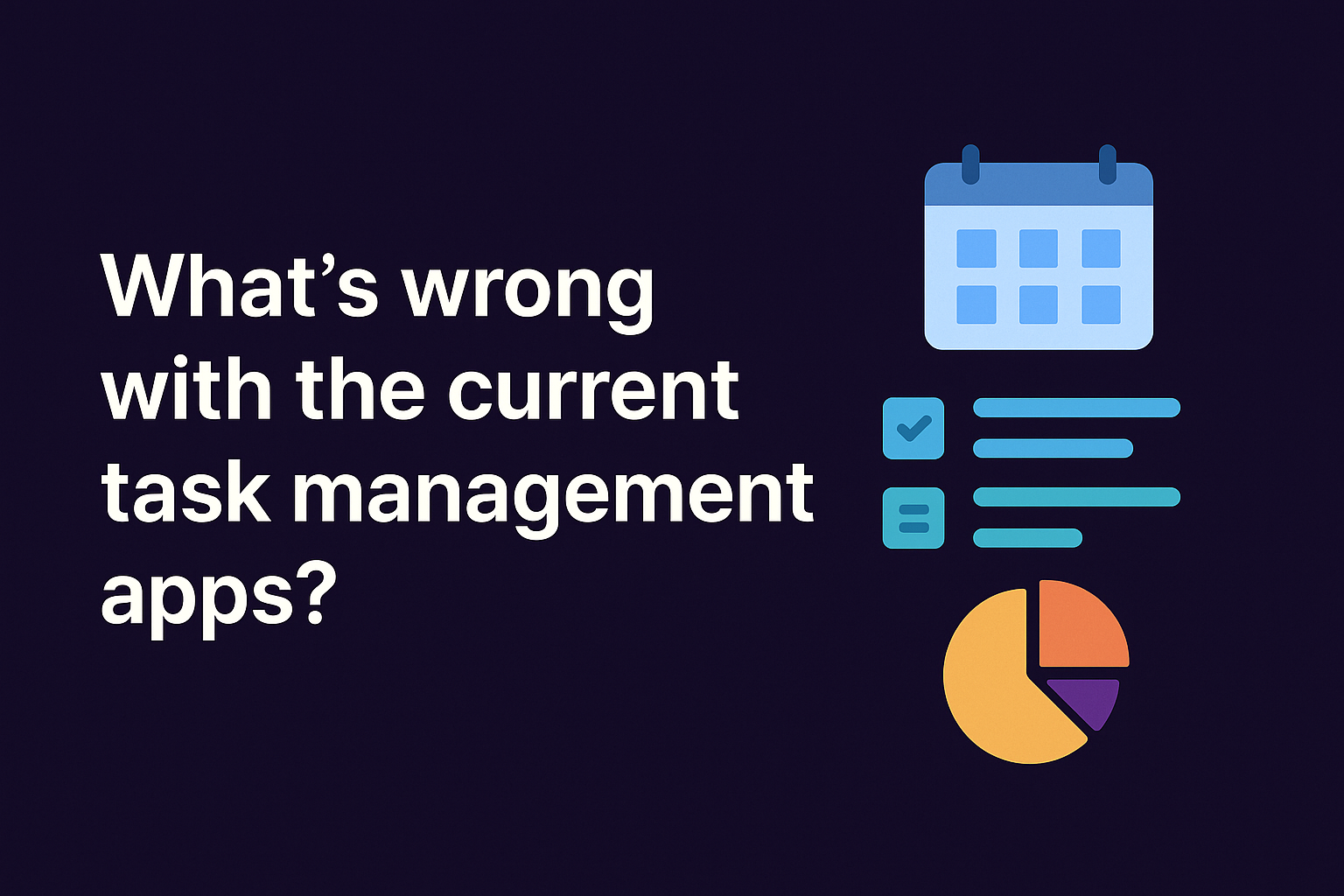What's Broken in Most Task Apps (And What Self-Manager Does Better)

Introduction
Most task apps remix the same templates—boards, calendar overlays, and a blizzard of toggles—while real work drowns in notifications and context switching. Independent research shows fragmentation and interruptions are the biggest productivity killers, not a lack of views. Self-Manager flips the model: make time the backbone, keep AI in context, and ship calm defaults that protect focus—so teams do more skilled work with fewer clicks.
What's Broken in Most Task Apps (Quick Proof)
1. Tool/Feature Sprawl → Context-Switching
Workers lose huge chunks of time hopping between apps and features. Microsoft's Work Trend Index and Asana's Anatomy of Work both flag "work-about-work" and fragmentation as major drains. Microsoft Research shows that employees spend excessive time navigating between tools instead of doing actual productive work.
2. Notification Overload → Fractured Focus
Constant pings and "always-on" culture erode attention and well-being. Recent studies show employees actively carving out "digital silence." Research from IT Pro reveals that workers are demanding quiet time to focus on tasks without interruption.
3. Calendars Misused as Task Lists
Events and tasks have different semantics; forcing tasks into calendar slots often backfires. Time boxes don't fit, and tasks spill over. Industry analysis shows that this mismatch creates more problems than it solves.
4. Interruptions Are Expensive
Classic HCI research shows it takes approximately 23 minutes to regain focus after an interruption—multiplied by all those tiny switches throughout the day. UC Irvine research demonstrates the true cost of interrupted work: more speed attempts but higher stress and lower quality.
5. Feature Bloat Hurts Usability
Extra knobs slow people down and bury the core action—finish the task. Research shows that app bloat is real and actively hurting productivity rather than enhancing it.
What Self-Manager Does Better
Stop Planning in a Board. Start Planning in Time.
Boards are great for swimlanes; daily work lives on dates. Self-Manager organizes capture, planning, and review by day/week/month so teams see "what actually happened" and "what's next" without jumping views. This directly fights fragmentation called out in industry reports.
Your week at a glance → instant reality check (not a wish-board).
AI Where You Work, Not Where You Copy-Paste
Every table (tasks, reviews, pinned views) has AI summaries plus an always-on chat panel tied to the current data. You can ask follow-ups like "What slipped last week?" or "Group blockers by project" without exporting to a separate AI tool—cutting tool-switching and interruptions.
Ask your week a question.
Fast Task Generation from Raw Text
Paste any brief or meeting notes → AI builds a structured task table with priorities. This replaces the slow, error-prone ritual of manually transcribing notes across apps (another source of "work-about-work" documented by Asana).
Streamed Responses + Two AI Modes
AI outputs stream in real time so you don't wait on spinners, and you can choose Fast (snappy) vs Thinking (deliberate) depending on the task. This respects flow and reduces micro-interruptions documented in focus research.
Focus Over Features
Self-Manager prioritizes the core loop—capture → plan → do → review—instead of cargo-cult add-ons. This is a deliberate anti-bloat stance (fewer menus, faster actions), aligned with what research says about app sprawl harming productivity.
Reviews that Tell the Truth (Because Your Data Lives on Dates)
Because everything is date-native, weekly/monthly overviews and trend stats are instant and truthful: what got done when, what rolled, where the bottlenecks are. That's much harder to compute from board-centric tools without heavy manual grooming. This addresses leadership's need for clarity noted in the Asana and Microsoft reports.
Calm Defaults for Notifications
Self-Manager follows a design philosophy of fewer, smarter alerts (e.g., summaries and scheduled reviews over constant pings). This directly addresses "ping fatigue" and the move toward intentional digital silence that workers are demanding.
Simple, Predictable Pricing + Unlimited Collaborators
Teams don't need yet another tool tier just to collaborate. $5/month Individual Plan or $20/month Team Plan with unlimited team members—reduce the organizational context switching of "who gets access where."
Built on Google Cloud/Firebase
Speed, reliability, and modern infrastructure. For buyers, "less downtime, less cognitive drag wondering if the tool will load" supports the focus argument. Enterprise-grade infrastructure without enterprise pricing.
Fewer Features, More Finished Work
The productivity software industry has convinced us that more features equal better outcomes. But research tells a different story: fragmentation, interruptions, and cognitive overload are what actually kill productivity.
Self-Manager is built on a simple principle: reduce friction, protect focus, and let AI handle the busywork. No board sprawl. No notification storms. No copy-pasting between tools.
Just a clean, date-centric workspace where planning, execution, and reflection happen in context—with AI that stays beside your data instead of in a separate tab.
Ready to Reclaim Your Focus?
Try Self-Manager's 7-day free trial—no credit card required. See how a simpler, smarter approach to task management can help your team ship more with less stress.
Key Takeaways
- Context-switching costs time: Industry research shows workers lose significant productivity hopping between tools and views
- Interruptions are expensive: It takes ~23 minutes to regain focus after each interruption
- Date-centric beats board-centric: Organizing by time gives teams instant clarity on what happened and what's next
- AI in context cuts friction: Built-in summaries and chat eliminate tool-switching for analysis
- Calm defaults protect focus: Fewer, smarter alerts reduce notification fatigue
- Simple pricing scales: Unlimited collaborators without tier anxiety
Self Manager
Manage tasks, take notes
and upload related images
7 days free trial
Easily log in with your Google, Microsoft, Apple or X/Twitter account